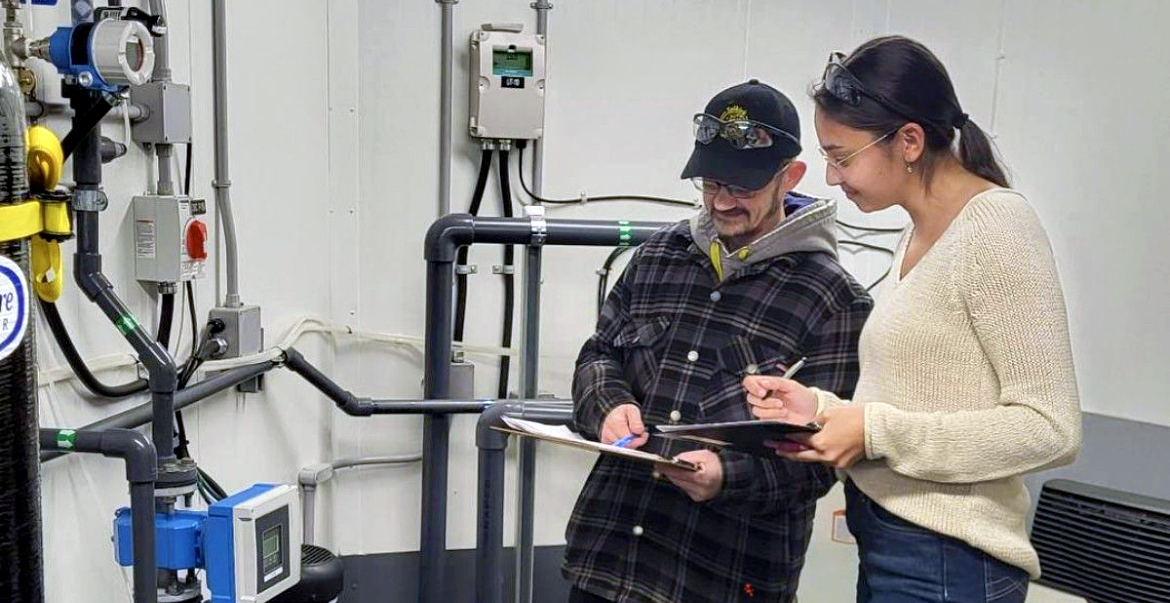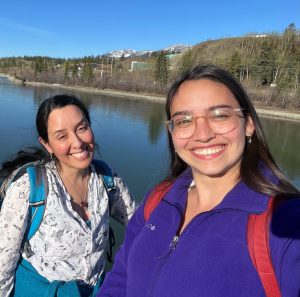Carleton Environmental Engineering Students and Yukon Water System Operators Collaborate for Clean Drinking Water
Tyrone Burke
Canada has countless lakes, rivers, and glaciers. Yet despite the apparent abundance of fresh water, not everyone in the country has access to safe drinking water. Many rural and remote First Nations have had long-term drinking water advisories that require water to be boiled or even trucked in from elsewhere. Over the past decade, many advisories have been lifted, but simply installing new water treatment systems won’t solve the problem on its own.
Water treatment systems need to be operated on a long-term basis, and it is important that community members have the skills and knowledge to operate them. It is also essential that environmental engineers know which systems are best suited to rural and remote communities.
A new partnership between Carleton and Yukon University connects environmental engineering students and water system operators to build bridges between the people who design small water treatment systems, and the ones who use them every day.
“We wanted to bring these groups together to tackle the challenge of access to safe drinking water,” says Lydia Hoffmann, a Master of Engineering graduate student in Environmental Engineering whose master’s project is centered on the initiative.

“So, we developed a co-training program that has the goal of increasing both parties’ capacity by exchanging our respective knowledge. System operators are great 3D thinkers. They are comfortable at solving things in the physical, whereas engineering students are trained to be good 2D thinkers–to solve theoretical problems on paper.”
“This project allows engineering students to gain hands-on skills, and operators to learn how solving something on paper such as chlorine disinfection, can empower them in their role.”
The weeklong program takes Carleton environmental engineering students to Whitehorse, where they learn about the day-to-day realities of water treatment at Yukon University’s Mobile Water Treatment Plant, a ‘lab on wheels’ used in the university’s Water and Wastewater Operator Program.
“We acquired the Mobile Water Treatment Plant so that our students would have an industry-standard system to learn on,” says Alison Anderson, Instructor/Coordinator of the Water and Wastewater Operator Program at Yukon University. “Previously, operators would learn concepts on paper or in a table-top lab and then sometimes feel intimidated when they started working in a community water treatment plant. Hands-on learning in a functional plant, in a low-risk setting, is a big confidence-booster.”

“Operators have first-hand experience with water treatment systems, and deal with the challenges of operating them on a day-to-day basis,” adds Hoffmann. “They have good tips and tricks, and a lot of good stories. For engineering students, it enhances classroom-based learning. Instead of explaining something theoretical, you can do an activity that demonstrates a concept in action. We change filters and troubleshoot when things go wrong. So, you can see how actions have outcomes.”
Enabling Both Students and Operators
Anderson also notes how the program is mutually beneficial, as operators not only share their expertise with engineering students, but also gain new perspectives on how they can address operational issues.
“For our operator students, the co-training program further enhances their learning and confidence,” she says. “They get to share their knowledge and show engineering students how something works. Also, the engineering students expose operators to another way of thinking and they learn how operational issues can be approached and solved using engineering principles.”
To date, the program has co-trained 20 engineering students and system operators. Hoffmann hopes it will help lay a foundation for stronger working relationships in the future.
“Many operators have had negative interactions with engineers, but students are more open to feedback, and can learn from the operators’ experience,” she says. “Building strong relationships creates a level of trust and respect that has not always been there in the past.”
There can be good reason why trust is lacking. Hoffmann cites an example of one Yukon community where engineers recommended a system that the community could not actually use.
“I visited a small community with a newly installed, overly complicated water treatment system,” she explains. “Unfortunately, no one in the community was trained or qualified to operate it, leaving the plant unused.”
Helping Students Develop Soft Skills
Engineering education is strongly focused on technical skills, but in the real world, soft skills are often just as important. Communities across Canada rely on smaller water treatment systems to keep their residents healthy, and engineers need to learn how to understand what these communities want and need.

“You need to get out into the field to see how things really work,” says Onita Basu, a professor with Carleton’s Department of Civil and Environmental Engineering and the supervisor of Hoffmann’s master’s project.
“Students need to know how to learn about community expectations, community interest, and community capacity. All of those have to go together.”
And though smaller water treatment systems serve fewer people than larger ones do, they are actually the most common type of water treatment system in Canada. About 60 per cent of systems are smaller ones.
“There are about 180 smaller water treatment systems in Canada, but because they only serve 15% of the population, they are always under the radar,” Basu explains. “These systems have special needs—and the communities they serve have special considerations. For example, some First Nations do not want any chemicals added to water during treatment process. Until we get engineering students to understand the unique profile of these communities, we are never going to knock problems in our small water systems.”
It’s a challenge that resonates with Anderson, who has seen first-hand how neglecting operational considerations within these communities can create significant issues, underscoring the importance of educating future engineers about the practical aspects of system design.
“As a professional engineer who has worked on water treatment plants across the Yukon, I know that operational considerations are not always at the forefront of infrastructure projects,” says Anderson. “This can lead to big headaches for both communities and engineers when water plants can’t be operated as intended. It’s exciting to work with Carleton to help future engineers understand the operations of the systems they will be designing.”
This past March, Hoffman took part in Carleton’s annual Three Minute Thesis Competition and was named a finalist for her presentation, “Coming Together: Can engineers and water operators co-train to improve small community water systems?”